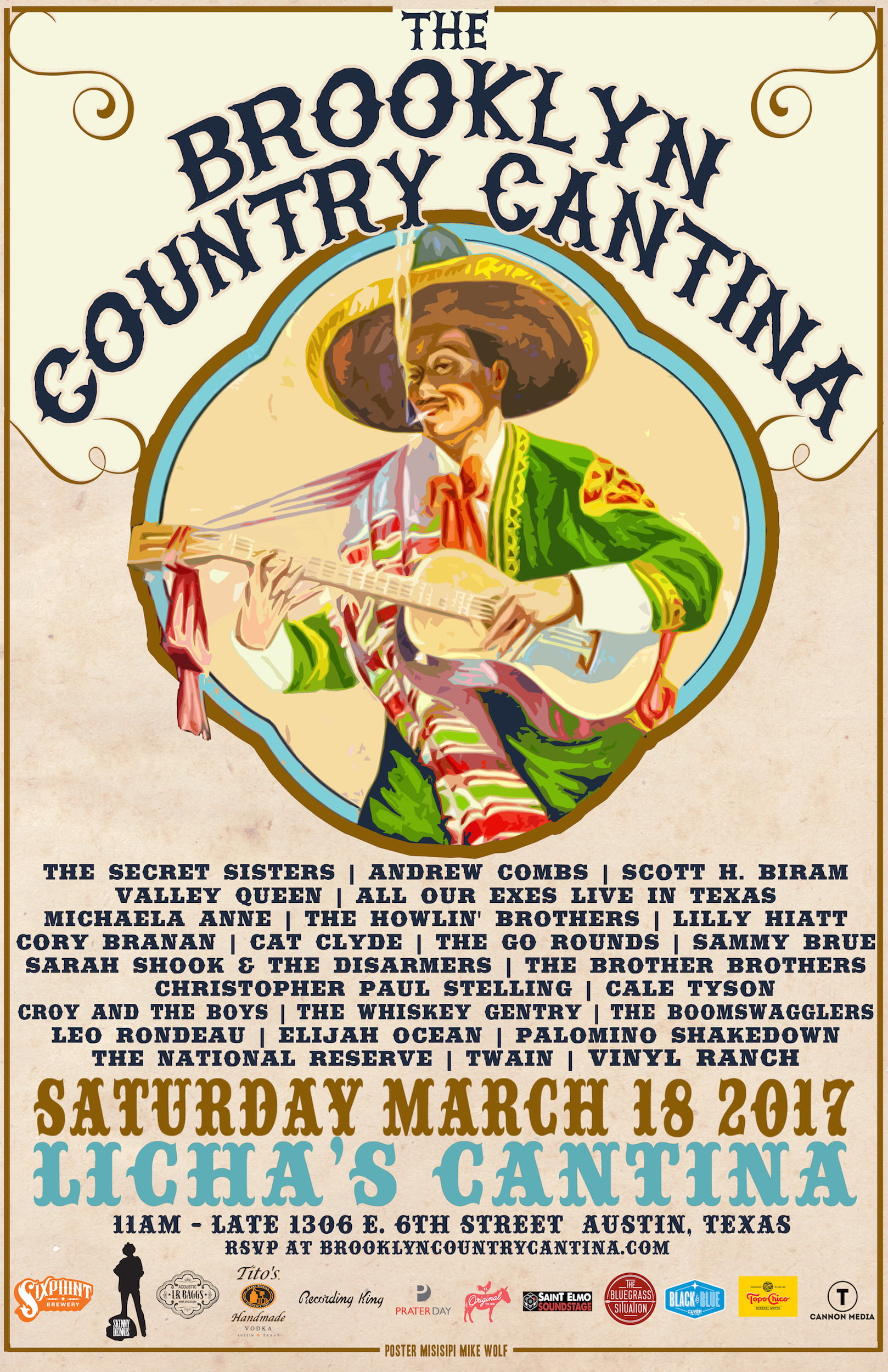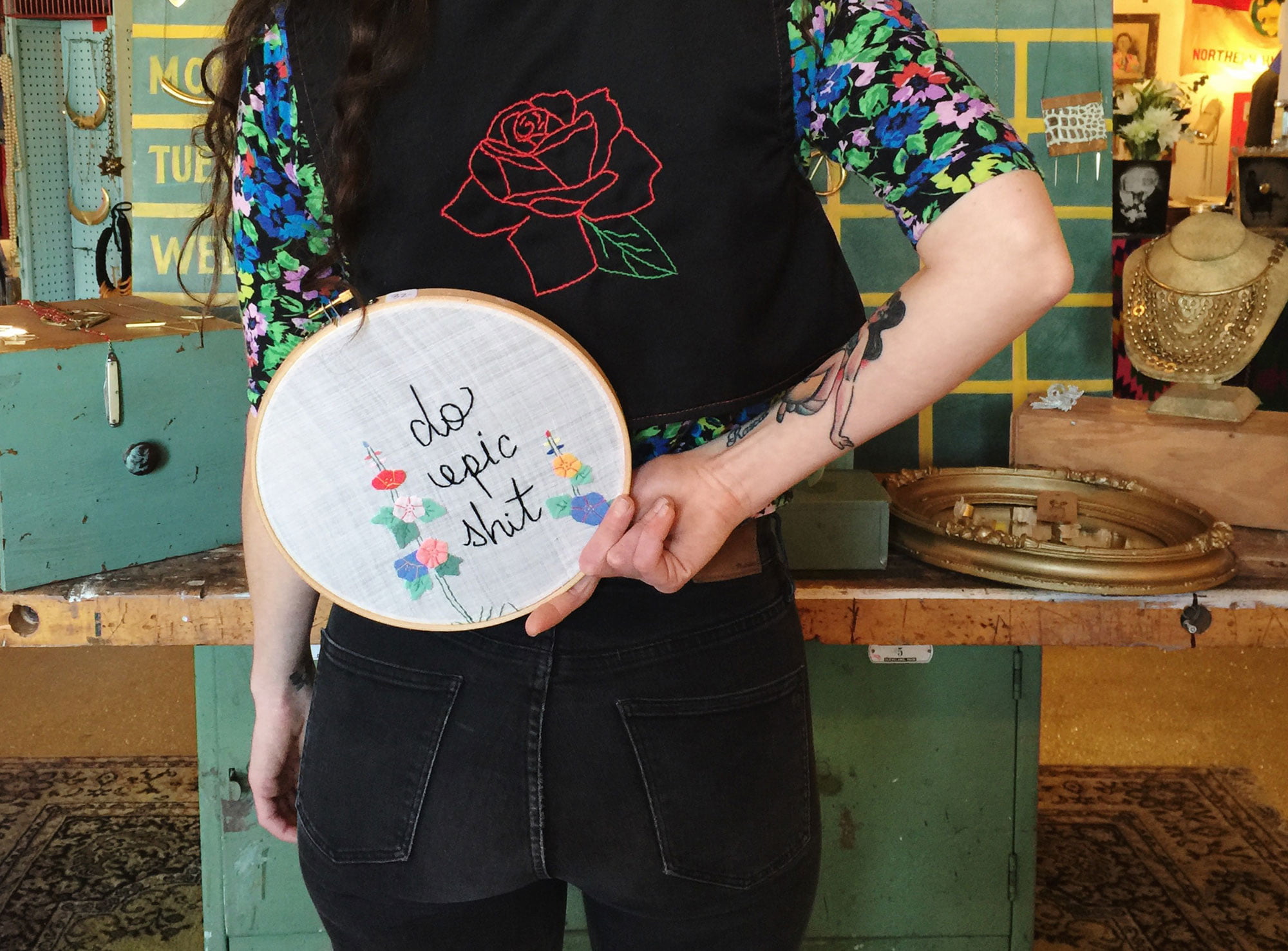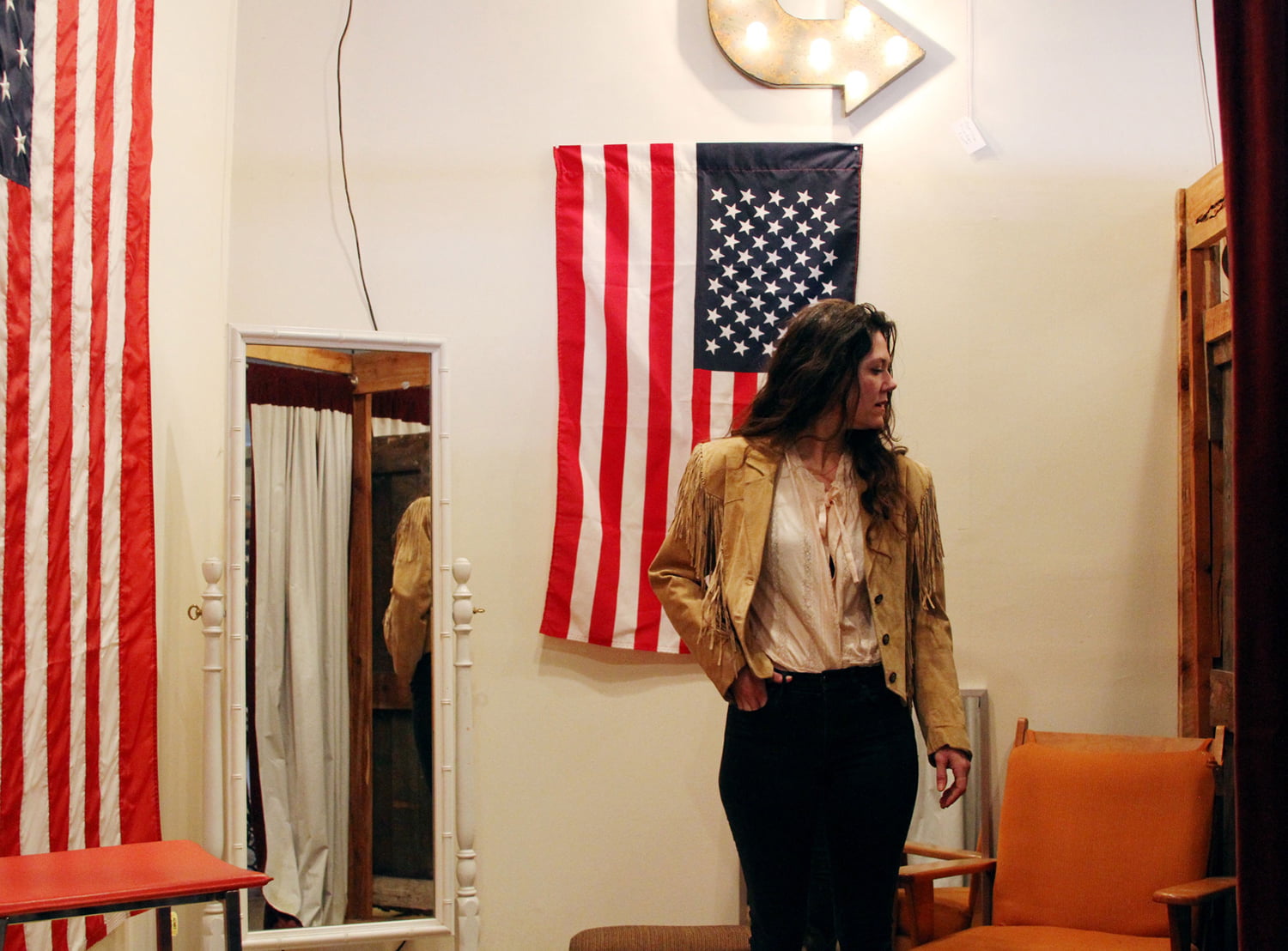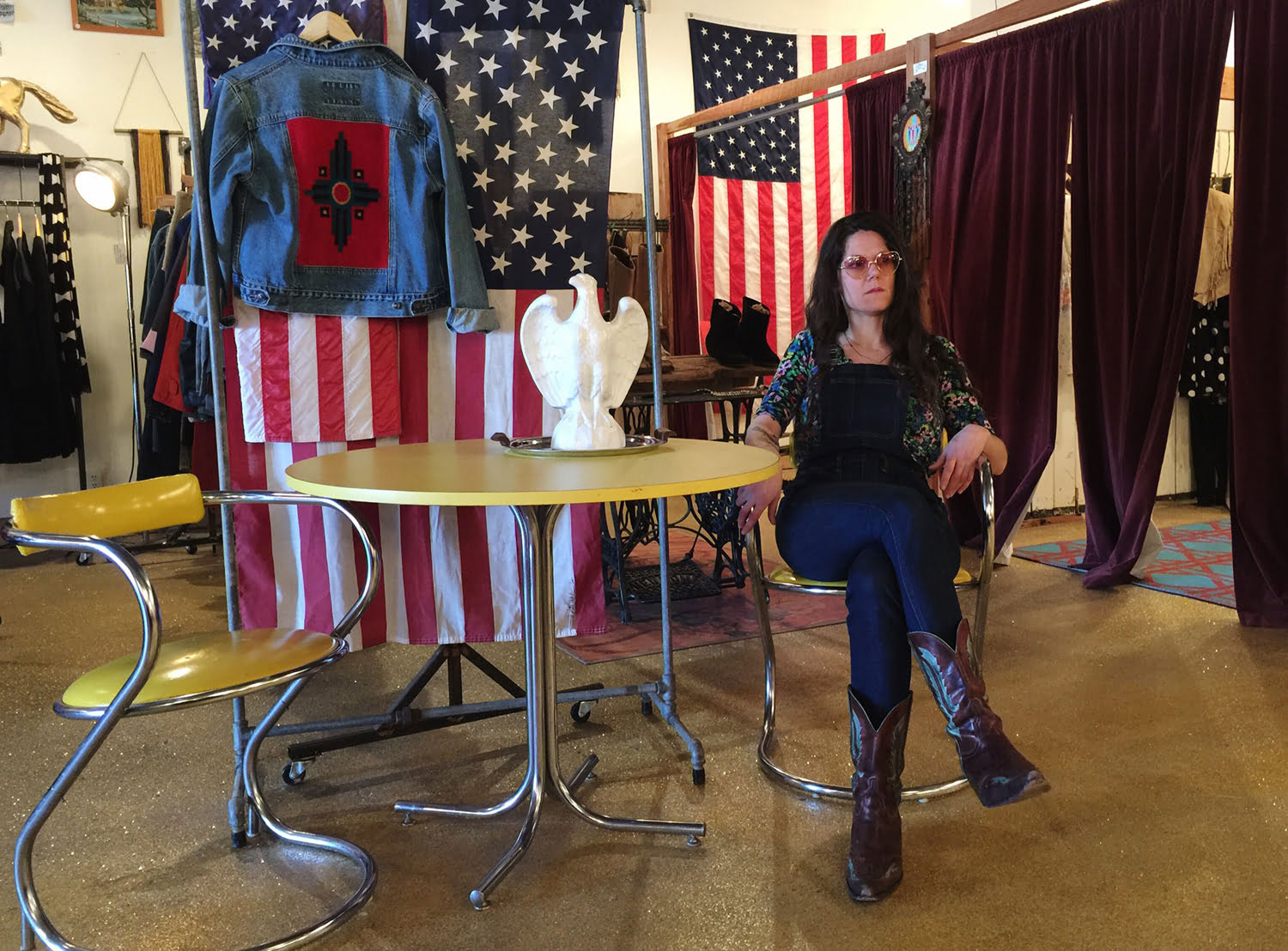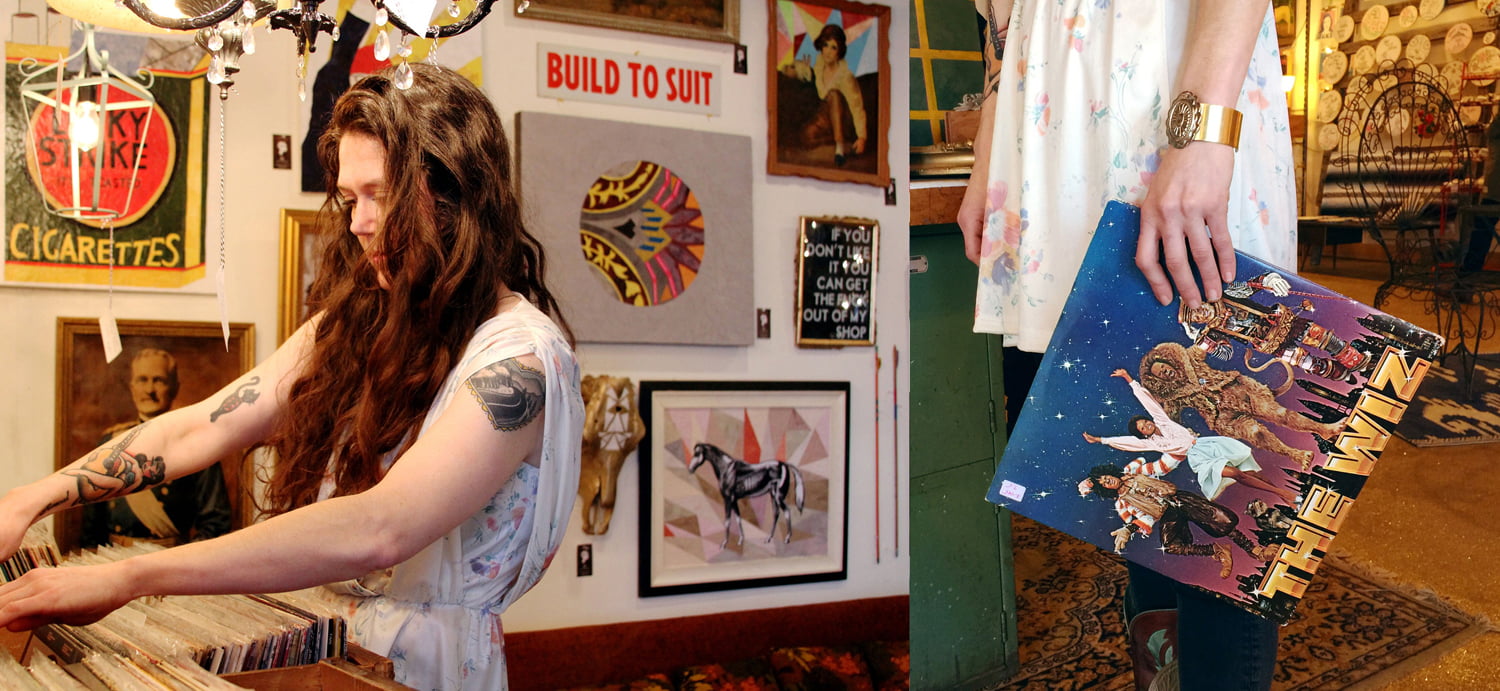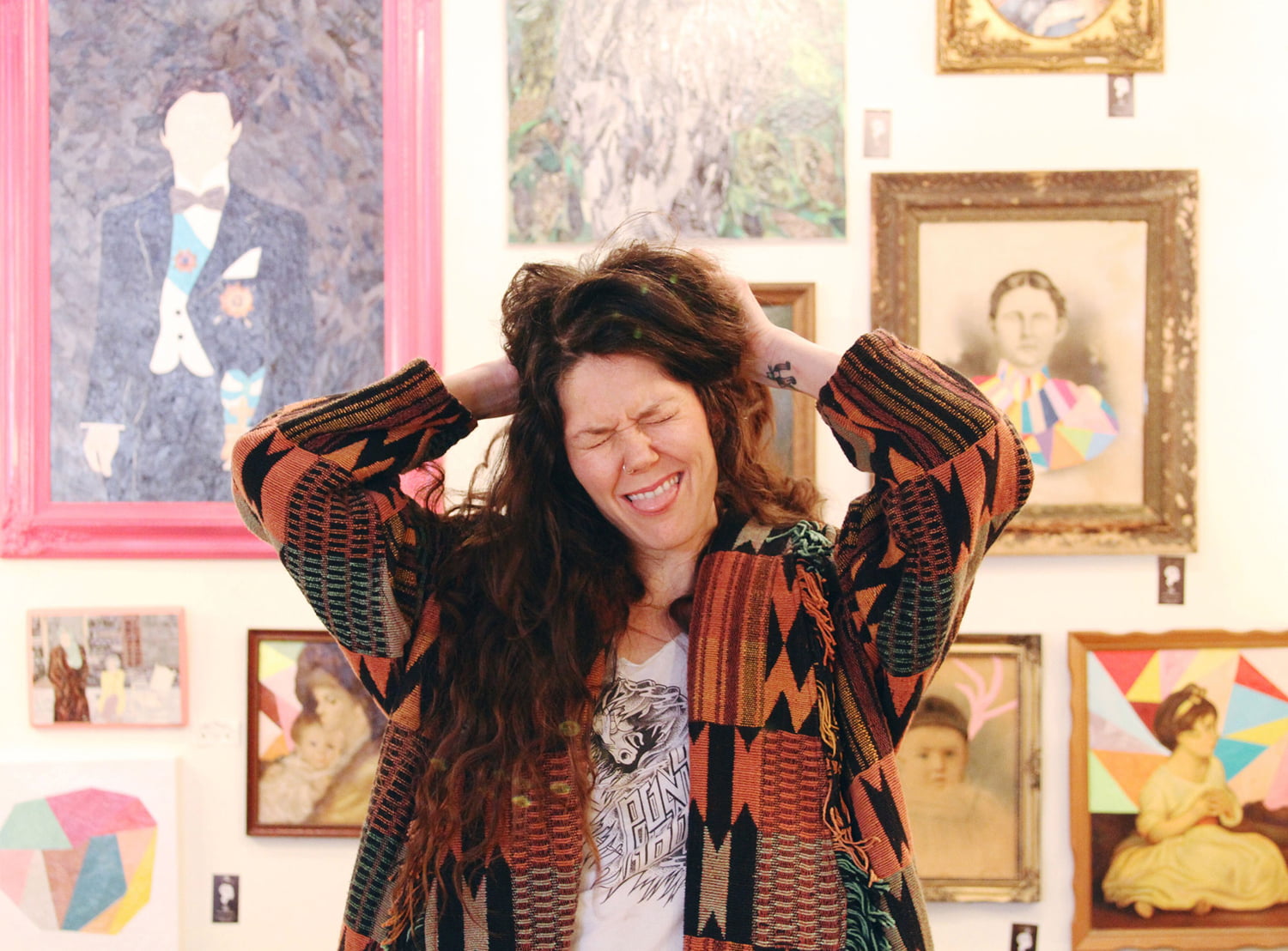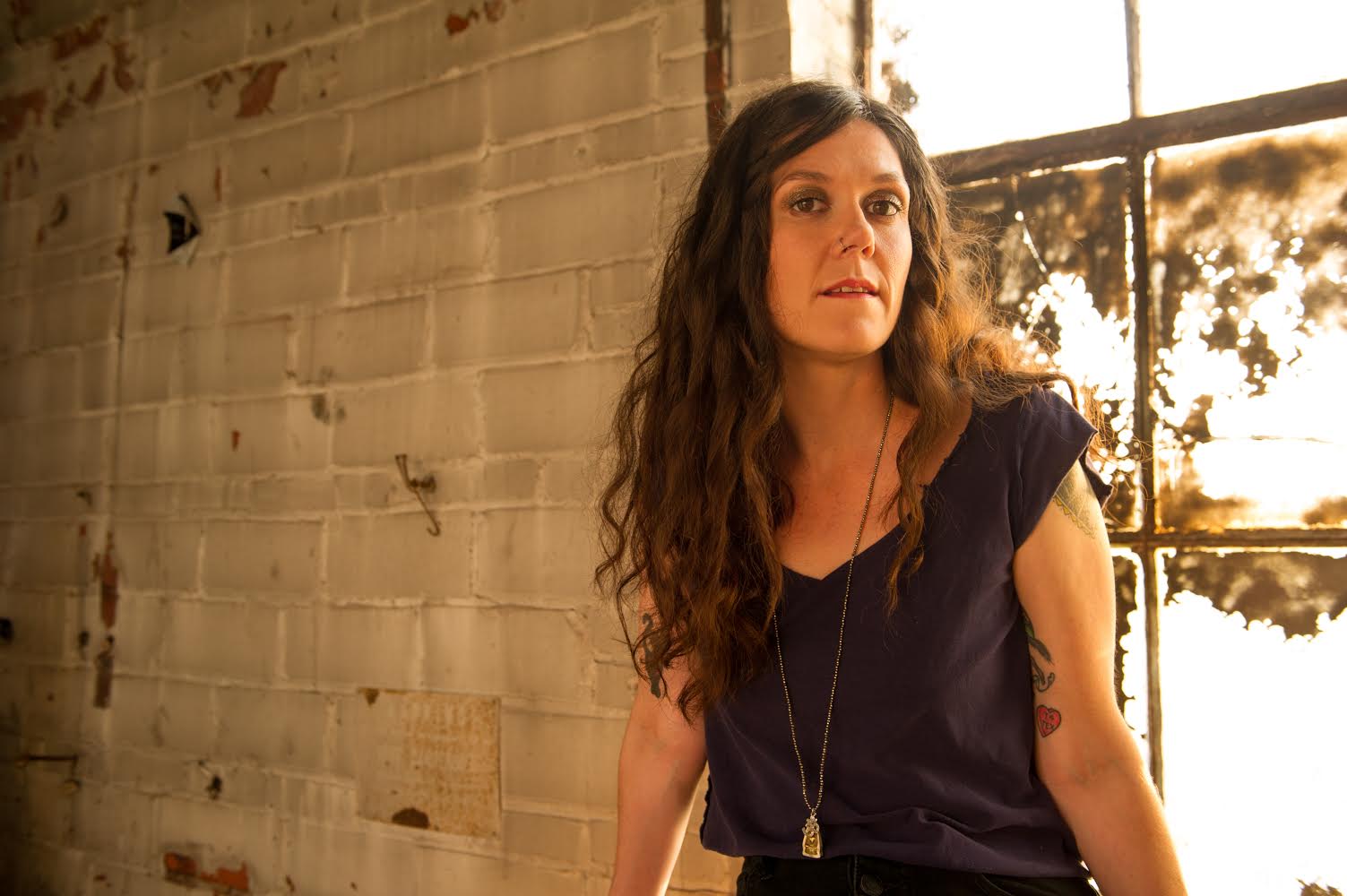It seems like every year is a great year in roots music, packing in way more excellence than a single list can handle. That’s why, for our year-end songs collection, the BGS writers have picked tunes they love that were not on any of our year-end albums. That’s not to say that the whole albums represented here aren’t great, though, so use these songs as invitations to dig deeper.
Andrew Combs, Canyons of My Mind, “Dirty Rain”
Over the three excellent albums, Nashville’s Andrew Combs has proven himself to not only be a songwriter of the highest order, but one with few creative boundaries — he’s bounced from traditional twang to countrypolitan to indie rock, always landing on illustrative stories and cutting vocals moments. On “Dirty Rain,” from Canyons of My Mind, Combs studies a world where our children are left with no vestiges of the planet’s former splendor on which to play — whether it’s green spaces now filled with buildings or books replaced by iPads. “What will all our little children say, when the only place to play is in the dirty rain?” asks Combs, taking his range into stirring falsetto, a gorgeous turn that reminds us that there is still beauty in this world: It’s just up to us to preserve it. — Marissa Moss
Angaleena Presley, Wrangled, “Wrangled”
As a songwriter — and, indeed, an essayist — Angaleena Presley is one of the most potent voices currently putting pen to paper in Nashville. Her sophomore solo release, the wonderful Wrangled, is chock full of cultural commentaries and confessions. On the captivating title track, Lady A filters her own professional frustrations through the lonesome lens of a housewife who feels unappreciated. “Rather eat dirt than bake another prize-winning cherry pie,” she sings with an air of resignation that perfectly encapsulates the emptiness of going through all the right motions and playing all the right parts only to be left feeling utterly unfulfilled and unseen. — Kelly McCartney
Anna Tivel, Small Believer, “Alleyway”
Had “Alleyway” been written in a different era, it likely would’ve found its way into the Brothers Grimm’s treacherous collection. It’s a fairy tale for the flawed. Detailing a one-night stand gone awry, the song examines broken decisions made by broken characters. Tivel’s voice — a whispering alto — works within the song’s minimal strings-based arrangement to tell a bleak but no less beautiful story with razor-sharp lyricism. When she sings, “I guess some folks are born to lose. Some kids are born for someone else’s cradle,” the consonants’ rhythmic pattern communicates her poetic ear for delivering such shattering truths. But while the blunt realism bound up in her writing may lean toward despair, she doesn’t leave things in that fraught territory. Instead, Tivel infuses them with small glimmers of hope, the kind that arise from the simple, oftentimes brave act of moving forward. — Amanda Wicks
The Barr Brothers, Queen of the Breakers, “You Would Have to Lose Your Mind”
The Barr Brothers’ standout, “You Would Have to Lose Your Mind,” off their album, Queen of the Breakers, creates a tension between lived dystopia and imagined utopia. Oscillating between those two polarities, the song takes on multiple melodic personalities, beginning with dreamy shoegaze before shifting into frenetic rock, a la the War on Drugs, and concluding with electrified chamber folk. As a result, everything edges toward cacophony, but the band keeps it together, instead tautening the emotional tightrope through Brad Barr’s contorted vocals and Sarah Pagé’s strings. A dip into madness shortly after the halfway mark builds out into a freeing crescendo, even if that sensation isn’t wholly assured. “Am I on the other side? Am I dreaming?” Brad asks, imagining something better than what he sees. But is the vision enough? — AW
Chastity Brown, Silhouette of Sirens, “Carried Away”
One of the beauties of Americana as an umbrella descriptor is that it allows for experimental branches to reach out far and wide while still remaining grounded by their roots. Chastity Brown is a perfect example of that. At her core, Brown is a folk singer, telling important stories with an acoustic guitar. But, when you zoom out from there, she’s so very much more than that, as evidenced on “Carried Away” off Silhouette of Sirens. Here, the acoustic guitar and confessional story still drive things along, but they collide with a swinging drum groove and a lyrical cadence that wouldn’t be out of place in a spoken word slam. Anyone who says they don’t like Americana music clearly aren’t paying attention and certainly haven’t heard Chastity Brown. — KMc
Dan Auerbach, Waiting on a Song, “Never In My Wildest Dreams”
On his sophomore solo effort, the Black Keys frontman exudes his vintage version of Music City. After moving to Nashville in 2010, he opened Easy Eye Sound studio and has now launched his own record label with the same name. Waiting on a Song is the label’s first output, and Auerbach recruited veterans like Duane Eddy, Dire Straits’ Mark Knopfler, and John Prine to complete the project. A collection of breezy ‘70s pop, the album’s standout comes midway through with “Never in My Wildest Dreams.” Clocking in at just under three minutes, the stripped-down track is a gentle rumination on love that serves as a reminder that good things come in small packages. — Desiré Moses
Flatt Lonesome, Silence in These Walls, “Where Do You Go”
Covering a song by a mainstream country star is an age-old tradition in bluegrass, going back as far as the very beginning of the genre. Decades ago, Bill Monroe, the Stanley Brothers, Flatt & Scruggs, et al started and propagated the trend, but Flatt Lonesome have now perfected it. Following on their hit cover of Dwight Yoakam’s “You’re the One” in 2015, their brand new album, Silence in These Walls, includes a pristine, soaring, goosebump-inducing rendition of Glen Campbell’s “Where Do You Go.” Siblings and band front-people Buddy Robertson, Charli Robertson, and Kelsi Harrigill have also perfected high lonesome, exquisitely emulsified sibling harmonies and, if they hadn’t recorded this song, we wouldn’t have known it was the tailor-made vessel for their masterful three-part. — Justin Hiltner
Gina Clowes, True Colors, “Saylor’s Creek”
Banjoist Gina Clowes was virtually unknown on the national bluegrass scene before joining veteran outfit Chris Jones and the Night Drivers. Now, barely two years later, she’s on the cover of the holy grail of banjo publications, Banjo Newsletter, and her debut solo album, True Colors, was released by Mountain Home Music. Though the Night Drivers are almost entirely a straight-up traditional band, her playing style is dynamic, thoughtful, intricate, and free. Plenty of banjo players with similar gigs would be content to simply regurgitate their favorite JD Crowe and Earl Scruggs licks interminably, but Clowes is not satisfied with tradition just for tradition’s sake, as evidenced all the way up and down True Colors — especially in original tunes such as “Saylor’s Creek.” — JH
Imelda May, Life Love Flesh Blood, “Call Me” / Rogue + Jaye, Pent Up, “Forces of Decay”
Sometimes, the vibe of a song is enough to make me love it. But, when that vibe gets topped off with stunning vocals and heartbreaking lyrics, well, I’m done for. As such, both Imelda May’s “Call Me” and Rogue + Jaye’s “Forces of Decay” have spent a lot of time on repeat this year. Thematically, these cuts each take on crumbling relationships from slightly different perspectives. In May’s tale, the love affair is all but over, though the singer clings to the thinnest thread of hope that it’s not because her longing is keeping her alive. R + J’s seems to have a smidge more hope than that, but eventually resigns itself to mere gratitude for having loved and lost than not having loved at all. Moral of the stories: If your heart has to break, may it break beautifully. — KMc
John Moreland, Big Bad Luv, “Sallisaw Blues”
Sallisaw, Oklahoma, is the hometown of the Joad clan in John Steinbeck’s The Grapes of Wrath, the place the family must leave when the Dust Bowl gets too dusty. It’s become a piece of a mythic America, heavy with meaning, not unlike nearby Okemah, home of the perpetually uprooted Woody Guthrie. In “Sallisaw Blues,” the opening track on Okie singer/songwriter John Moreland’s fourth album, it’s a place that’s easy to leave and hard to stay. “Slumming I-40 with American songs,” he sings in his robust voice, a little of the old punk showing through. “They can bury our bodies in American wrongs.” The song nearly runs off without him, thanks to a barbed blues lick and a reckless harmonica, but he’s looking for a bit of wisdom out in the American wilderness, using his guitar like a dowsing rod. In Sallisaw, Moreland is, to use Steinbeck’s language, “jus’ pain covered with skin.” — Stephen Deusner
Josh Ritter, Gathering, “Dreams”
Josh Ritter’s experimentation on his new album, Gathering, finds fruition in all manner of musical styles, but he pares things down with “Dreams,” creating a powerful, almost manic, look at a character running off the rails. The quickly delivered free-verse comes closer to a spoken word confession and lists the debilitating incidents keeping the song’s central figure from finding creative absolution. Against structured chamber folk, an infrequent piano riff shivers like a thunder-strike, underscoring the “gathering” storm that has led to this admission. Building on Ritter’s 2015 album, Sermon on the Rocks, the lyrics oscillate between religious and secular imagery; he sings, “Can I outstrip a creator who searches and finds me, then leaves me with demons that I already had?” The entire affair crescendos into an electrified frenzy that edges toward resolution, but in the end, keeps that conclusion just out of reach. — AW
Kacy & Clayton, The Siren’s Song, “The Light of Day”
Through their previous work, the Canadian duo of Kacy Anderson and Clayton Linthicum have proven their uncanny ability to conjure up a sort of folk that reaches not across genres but geographical planes: They weave as much British countryside into their music as they do Tennessee plains. But on their newest LP, Strange Country, they teamed up with Jeff Tweedy — who took the production reins — and came out with something deliciously psychedelic. And “The Light of Day,” which veers Anderson into Grace Slick territory and dips heavily into ’70s Southern rock, is this new equation at its best. “Keep your thoughts to yourself and you’ll be fine,” sings Anderson, welcoming some new, rollicking percussion, “Don’t let them see the light of day.” A menacing bit of advice in a world where the balance of what is said and what is heard has never been so skewed. — MM
Kurt Vile & Courtney Barnett, Lotta Sea Lice, “Over Everything”
Kurt Vile and Courtney Barnett’s first joint album is the collaboration we didn’t know we needed, but can’t imagine living without. The Australian rocker and indie kingpin are the perfect tag team, conjuring up warbling, wandering odes to daily life which, for them, centers around songwriting. The record’s opening track, “Over Everything,” is a back-and-forth exchange about the nuances of creativity that has Vile and Barnett picking up lines where the other leaves off and, in some cases, even jumping in early to finish the other’s thought. As spoken word poets wielding languid roots-rock, Vile and Barnett have made one of the most fun releases of the year. — DM
Leif Vollebekk, Twin Solitude, “Elegy”
From the somber heft in the opening piano chords — you can practically hear the keys being pressed — to the commanding bass line that amplifies the chorus, Leif Vollebekk’s “Elegy” exudes weight. It actually feels heavy. But the Canadian singer/songwriter doesn’t dwell in that sensation. He uses the interplay between the song’s melodic mass and its feather-light, stream-of-consciousness lyricism to give shape to the internal struggle at the center: What happens when you want to be better for someone, but can’t rise to the occasion? What happens when you finally do, and they’re no longer around? The conclusion to his narrative occurs at the chorus when he assuredly, if mournfully, sings, “Take a look at me now.” Achieving that moment hasn’t been easy, and “Elegy” artfully articulates the sacrifices made along the way. — AW
Lilly Hiatt, Trinity Lane, “Trinity Lane”
“I get bored, so I wanna get drunk,” sings Lilly Hiatt on the title cut of Trinity Lane. “I know how that goes, so I ain’t gonna touch it.” Melding Hiatt’s unique twang with raucous rock melodies, “Trinity Lane” is an ode to a person in progress who has learned from her mistakes and come out stronger. With production by Shovels & Rope’s Michael Trent, Hiatt’s breed of roots on songs like “Trinity Lane” pushes things back into sweaty clubs and spiraling guitars, never resting on the precious or precocious. Packed with little details, like the scent of cooking garlic or the temptation of the embrace of another, and ferociously constructed, “Trinity Lane” is a raw and honest document of Hiatt’s place in the world. — MM
Little Bandit, Breakfast Alone, “Bed of Bad Luck”
Country’s seen its share of soul this year, particularly in the Chris Stapleton era, but Little Bandit, led by Alex Caress, dips deep into some downright honky-tonk gospel with “Bed of Bad Luck,” off their debut LP Breakfast Alone. Centered on a gentle piano vamp and Caress’s heartbreaking howl, it’s as stirring as it is revelatory, with a backing choir of Caitlin Rose, Larissa Maestro, and Caress’s sister Jordan who help take the whole thing to church — except, here, church is a dusty bar or a lonely bed, with nothing but the scent of an old lover on the pillow. Somehow, Little Bandit is able to meld the timeless with the groundbreaking, coming out with country that doesn’t try to fit into a box. Instead, “Bed of Bad Luck” shapes its own box altogether. — MM
The Lone Bellow, Walk Into a Storm, “Is It Ever Gonna Be Easy”
Sometimes the simplest ideas carry the most weight. This highlight from the Lone Bellow’s third album, Walk Into a Storm, revolves around a question we’ve all undoubtedly asked ourselves over the course of 2017 — “Is it ever gonna be easy?” — followed by a plea for salvation — “Try so hard, please release me.” It’s a quintessential Lone Bellow anthem from Zach Williams, Brian Elmquist, and Kanene Pipkin that showcases their knack for wistfulness, perfectly executed vocal harmonies and catchy hooks. The trio moved from Brooklyn to Nashville and teamed up with producer Dave Cobb for this release, which draws enough upon the gospel tradition to impart a glimpse of what we all need right now: hope. — DM
Lukas Nelson & Promise of the Real, Lukas Nelson & Promise of the Real, “Find Yourself”
Landing at number one on the Americana charts, Lukas Nelson & Promise of the Real’s self-titled LP has undeniably become the band’s breakout release. But that’s not to say that the California-based musicians are newcomers. In fact, they’ve been honing their craft alongside music’s biggest icons for the past decade. While their collaborations with Lukas’s famous father, Willie, and stint as Neil Young’s backing band are common fodder for critics and fans, alike, this collection of songs solidifies the band’s status as a powerhouse in its own right. Nelson’s songwriting prowess is particularly evident on the album’s infectious lead single, “Find Yourself,” featuring none other than pop purveyor Lady Gaga on backing vocals. Dripping with soul and reaching the pinnacle with the declaration, “I know the love that I deserve,” it’s a post-breakup pick-me-up for the ages. — DM
Offa Rex, The Queen of Hearts, “Flash Company”
Dating back to Limerick, Ireland, in the 1850s, this ballad has been known by many different titles and recorded numerous times in the last 50 years, usually by British folk singers. Phoebe Smith did a beautiful and ragged version in 1969, and June Tabor may have sung definitive version, backed by Martin Simpson, on her 1981 album, A Cut Above. But the transatlantic folk-rock group Offa Rex deserves their place in the song’s history. Backed by members of the Decemberists, Olivia Chaney adds to the song’s long tradition, offering a restrained yet powerful interpretation of the central predicament: a women brought low by doomed romantic pursuits. Bonus points for proceeding with no break into “The Old Churchyard,” making explicit the idea that life proceeds directly to the grave. — SD
Rose Cousins, Natural Conclusion, “Freedom”
Rose Cousins captures the paradox of longing for release from the bonds of lost love, while simultaneously clutching every remaining trace as tightly as possible, downright exquisitely in “Freedom.” As all humans touched by love know intimately, liberation from the pain, the loneliness, the regrets, and what-ifs of romance feels like a mirage shimmering just out of reach. Cousins could have focused an entire song on the finality of this freedom alone, but anyone currently or formerly heartbroken knows that seeking this fabled oasis risks undercutting all that was beautiful, joyous, and heartening in love to begin with. And so “Freedom” grapples with these disparate truths of human connection all together. The result is heart-wrenching and comforting, hopeful and despondent, contradictory and perfectly accurate. — JH
Sam Gleaves & Tyler Hughes, Sam Gleaves & Tyler Hughes, “When We Love”
Both natives of southwestern Virginia — a cradle of old-time, bluegrass, country, and their offshoots — Sam Gleaves and Tyler Hughes are experts and acolytes of their region’s musical forms. This swathe of Virginia perfectly defines the forgotten, rural areas of working class America that have felt the political and economic turmoil of the last decade most intensely. But Gleaves and Hughes not only claim their homeland completely, they adore it, focusing on the love that brings us all together instead of the differences we would let drive us apart. With a soft, loping, open-back banjo and a simple acoustic guitar, they evoke the era of the Carter Family as they sing in two-part harmony, “When we love, we will make America great again.” — JH
Steve Earle, So You Wanna Be an Outlaw, “News from Colorado” / Aimee Mann, Mental Illness, “Lies of Summer”
A guy steals a car, lies his ass off, abandons his family, ends up on the wrong side of the law. That sentence sums up new songs by two singer/songwriters with remarkable catalogs that rarely intersect. On “News from Colorado,” Steve Earle sings from the point of view of a character just barely hanging on, perhaps some version of himself from years ago. He hears of his family’s schisms, but lacks the emotional wherewithal to do anything but shake his head and flinch at the ring of the telephone. “Brother stole another car,” Earle sings. “Sister says he’s in the Army.” The song — co-written with his niece, Emily Earle, and ex-wife, Alison Moorer — refuses to provide any easy closure, as the narrator once again realizes his own powerlessness.
Perhaps that troubled brother is the same subject of Aimee Mann’s “Lies of Summer,” now drugged into oblivion by well-meaning doctors. She balances her sympathy over his predicament with an almost scientific fascination over the young man’s deeds, wondering if they’re bad enough to warrant such harsh treatment. Both songs refuse any easy closure, as both narrators only gradually realize their complete inability to offer any comfort or exact any change in the situation. — SD
The Wailin Jennys, Fifteen, “Wildflowers”
The Wailin Jennys could have never known when they were recording their latest album, Fifteen, just how powerfully relevant their cover of Tom Petty’s “Wildflowers” would be for 2017. But then October 2 happened — the day of Petty’s unexpected passing and just three weeks before the street date of the Jennys’ first record in six years. If their lilting, perfectly harmonized version wasn’t already a strong contender for my top song, the weight of remembrance it now carries easily makes it one of this year’s best. — Amy Reitnouer
Will Hoge, Anchors, “Little Bit of Rust” / Charlie Worsham, Beginning of Things, “Cut Your Groove”
Admittedly, I don’t listen to commercial country radio because I have zero interest in songs comparing women’s bodies to curvy roads. But, in an alternate radio universe that had some measure of thoughtfulness and taste, Will Hoge and Charlie Worsham shoulda/coulda/woulda had huge country hits with “Little Bit of Rust” and “Cut Your Groove,” respectively. Alas, these guys are thinking man’s songwriters so the Chevy truck in Hoge’s tune, while a part of the story in its own right, also serves as a metaphor for a marriage that’s lost a bit of its original shine. One of numerous stand-out tracks on the record, “Little Bit of Rust” is catchy as all get-out and features Sheryl Crow on harmonies, to boot. With Worsham, “Cut Your Groove” sounds like a really good Keith Urban tune … just … better. The hook is irresistible and memorable, the message universal and positive, so its lack of success is inexplicable. Go home, country radio. You’re clearly drunk. — KMc
Hear the entire BGS Class of 2017 here:


